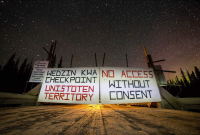Support strong Canadian climate journalism for 2025
More than a dozen people have been arrested for protecting territory that is blocking access to a new pipeline project in British Columbia.
RCMP say they arrested 14 people from a blockade to a forest service road in northern part of the province that is preventing access to the pipeline project.
Mounties say the arrests took place at the Gitdumt'en checkpoint on Morice West Forest Service Road for various offences, including alleged violations of an injunction order against the blockade.
They allege officers saw a number of fires being lit along the roadway.
Journalists say that the land defenders who were protecting their territory were not armed.
Members of the Gidimt'en clan of the Wet'suwet'en First Nation had set up a camp and a checkpoint in the area, southwest of Houston, which they said was to control access. They say that the area is their territory, which was never ceded to Canada under any treaty.
In a statement, RCMP say officers spoke with representatives of the camp about the removal of a road block along the roadway, and set up a meeting between hereditary chiefs and Coastal GasLink.
But police say at about 3 p.m., they realized the matter couldn't be resolved and they took action.
The statement says a temporary exclusion zone has been set up in the area where the police do not allow access to anyone who is not part of the enforcement team.
The RCMP says the zone remains in place and will be consistently re-assessed.
The statement also addressed what police called "erroneous" reports that RCMP jammed communications in the area, and that the military was present during the police enforcement operation.
"We would like to clarify that both of these allegations are incorrect," the statement says. "The area is extremely remote and even police had limited access to communication."
Mounties said earlier Monday they would enforce the interim injunction issued by the B.C. Supreme Court in mid-December. The court ordered the removal of any obstructions interfering with the Coastal GasLink project.
The injunction gave protesters 72 hours to remove obstructions and the police say that had not happened, preventing Coastal Gaslink Pipeline Ltd. from being able to do any work in the area.
The pipeline by TransCanada subsidiary Coastal GasLink would carry natural gas from the Dawson Creek area to Kitimat.
The company says it has signed agreements with all First Nations along the route for LNG Canada's $40-billion liquefied natural gas project in Kitimat, but demonstrators argue Wet'suwet'en house chiefs, who are hereditary rather than elected, have not given consent.
A news release issued Sunday on behalf of Grand Chief Stewart Phillip of the Union of B.C. Indian Chiefs says all five Wet'suwet'en clans, including the Gidimt'en, oppose the construction of oil and gas pipelines in their territory.
"The provincial and federal governments must revoke the permits for this project until the standards of free, prior and informed consent are met," Phillip says in the release.
LNG Canada announced in October that it was moving ahead with its plans for the Kitimat export facility.
Construction on the $6.2-billion pipeline, which is 670 kilometres long, is scheduled to begin this month.
B.C. Premier John Horgan said LNG Canada's decision would help an economically deprived region of the province and bring in an estimated $23 billion in provincial revenue.
Around 2012, the Unist'ot'en camp set up a blockade by constructing a gate and other obstacles to the area, and a second gate was recently constructed at the Morice River Bridge, the company said in a document filed with the court.
TransCanada has said it is not asking for the camp at the bridge to be dismantled, only for access to its pipeline right of way.
Marches were planned across the country on Tuesday to support members of the Gidimt'en clan who oppose the pipeline project.
with files from The Canadian Press





Comments
I would like a legal and historical explanation of the treaty process to clarify the authority of the court's decision to issue warrants in cases such as this. I don't think it would stand up.
When my ancestors were settling on the land in Ontario and later, Manitoba, they were told they could do this legally. The Selkirk Settlement didn't ask permission to take the best land for themselves. They were granted the right to do so, but by whom? Certainly not by the occupants of the land at that time who didn't appear to be 'settled' on the land. The crown was the authority they turned to if they even thought about such questions.
When the crown wanted to formalize the relationship with the indigenous peoples that were encountered on the way to colonize the new territory they were discovering (irony here) that they needed a counterparty to negotiate with. Not seeing how indigenous society organized itself the crown appointed 'chiefs' to negotiate with. This, by the way, is what the colonial masters were doing in other parts of the world (Kenya, for example) as the so-called 'superior' races encountered 'inferior' peoples.
Now, in our time, we face the same set of challenges except we know better. The courts are pretending that the elected band councils are the authority that represents the indigenous population that somehow holds some kind of title (reserve land, and more irony) to the land that the pipeline company wants to build on. There exists another authority (Delgamuukw) but the courts are ignoring it.
This....is NOT Reconciliation !
The first nations have both elected representatives and hereditary chiefs. This is rather like our parliamentary system with the House of Commons and rhe House of Lords in the UK, or the House of Commons and the Senate in Canada. It is a requirement that legislation pass both houses before it can become law. The same should be be true for first nations and we should recognize this.
I nave never felt more ashamed to be a Canadian. A ey Supreme Court of Canada ruling from 1997, the Delgamuukw decision, upheld Indigenous peoples' claims to lands that were never ceded by treaty. B.C. has only a handful of treaties, and most of the province is unceded territory subject to various unresolved land claims. In the case of Gidimt’en, the RCMP issued a statement ahead of the Jan. 7 arrests arguing that “aboriginal title to this land and which Indigenous nation holds it, has not been determined,” and a trial is needed to settle the question. How can the Supreme Court rule that tile to land was never ceded and the RCMP interpret that to mean the title is in question? Disgraceful Justin Trudeau and John Horgan. This is colonialism and cultural genocide in action.